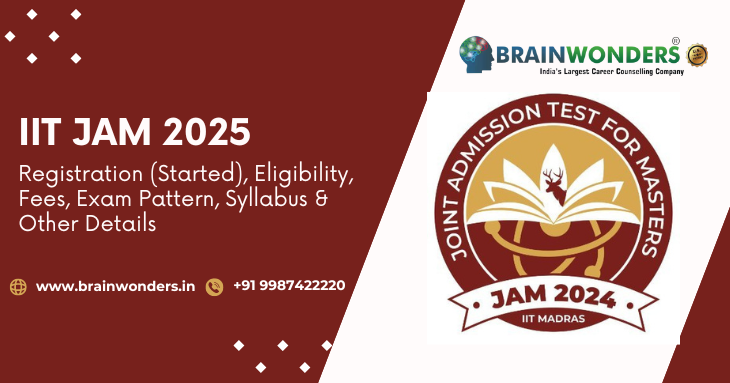

Take Brainwonders Career Test and make the right decisions for your college and course ahead
Let your unique personality, strengths, and traits guide to make the best decdision of your life!
Blog
04 January,2024 | By Brainwonders

NEET, National Eligibility and Common Entrance Test, is one of the toughest medical entrance examinations in the Republic of India. It is as a passage for the aspiring student to have an opportunity to join some of the best medical colleges within the country and do the popular course known as MBBS (Bachelor of Medicine and Bachelor of Surgery). Another feature of MBBS admission through NEET is the minimum marks required for student enrollment. Eligibility plays a really important role in determining the permits needed for MBBS admission through NEET. In this article, the author will highlight how much NEET one has to score to get into an MBBS course and what factors affect these scores.
As for the admissions to the BDS or Bachelor of Dental Surgery or Ayurveda, NEET is also important for the purpose. It is taken in ten languages, and approximately 40 nationwide testing organisations carry out the examination. As per the order of the Honorable Supreme Court of India, NEET is mandatory for undergraduate medical admissions nationwide. Hence, an insight into preparations that must be made when sitting for this examination is of paramount importance.
For the sake of offering you valuable data on the minimum NEET score required for MBBS admission, we have developed this blog.
The Full form of NEET is National Eligibility Cum Entrance Test; it is a test that is taken by students to gain admission to various medical colleges in the country. Since 2020, they mostly organised the Railway RRB’s senior second grade examination through NEET, And the previous system of having so many state level examinations for admission to the AIIMS and JIPMER institutions is no more now.
In line with the One Nation One Examination initiative, the Indian government introduced NEET as a means to streamline the admission process by replacing multiple tests with a single exam. NEET is the only undergraduate-level medical entrance exam conducted in the offline mode, using pen and paper.
The NEET examination is one of the most competitive examinations, and like most competitive examinations, the medical colleges in India measure their admission cut-off marks. Such colleges usually declare opening and closing ranks; in this case, scores that learners should apply for admissions.
| Institute Name | Ranks |
| AIIMS, Delhi | 51 |
| JIPMER, Puducherry | 4087 |
| Bahiramjee Jijibhai Medical College | 2295 |
| Maulana Azad Medical College, New Delhi | 16508 |
| Govt Medical College, Kota | 4844 |
| S.M.S. Medical College, Jaipur | 1185 |
| Govt Medical College, Thiruvananthapuram | 1078 |
| VMMC and Safdarjung Hospital, New Delhi | 138 |
| Seth G.S. Medical College, Mumbai | 935 |
| Government Medical College and Hospital, Chandigarh | 594 |
Disclaimer: The ranks mentioned above are estimated and based on research and calculations. They represent an average of expected ranks. Candidates are advised to stay updated and informed.
Please note that these factors play a crucial role in setting the cut-off marks, and they may vary from year to year based on various circumstances.
Admission in different states are determined based on the NEET (National Eligibility Cum Entrance Test) scores conducted by the National Testing Agency (NTA). The NEET cut-off marks for each state depend on factors such as the number of candidates, the difficulty level of the test, and the total number of MBBS seats available in the state.
For detailed information on the minimum and maximum marks required for MBBS admission in each state, please refer to the official websites of the respective medical institutions or the Medical Council of India (MCI) website.
However, provided below are approximate cut-off marks for different states:
Note: These are rough estimates and may vary. It is recommended to check the official sources for accurate and updated information regarding the cut-off marks for MBBS admission in each state.
| SR. No | State | UR | OBC | SC | ST |
| 1 | Delhi | 623-627 | 570--575 | 500-510 | 405-415 |
| 2 | Uttar Pradesh (UP) | 585-595 | 505-570 | 465-470 | 340-350 |
| 3 | Madhya Pradesh (MP) | 535-545 | 526-532 | 440-455 | 335-345 |
| 4 | Rajasthan | 595-610 | 580-585 | 480-485 | 460-465 |
| 5 | Uttarakhand | 540-545 | 506-510 | 370-380 | 400-470 |
| 6 | Bihar | 585-600 | 580-585 | 440-445 | 455-460 |
| 7 | Haryana | 590-605 | 575-580 | 480-490 | Not Specified |
| 8 | Himachal Pradesh | 560-565 | 535-555 | 490-500 | 470-480 |
| 9 | Punjab | 590-595 | 535-545 | 440-445 | Not Specified |
| 10 | Jharkhand | 580-585 | 575-580 | 440-445 | 375-390 |
| 11 | Chhattisgarh | 540-545 | 525-530 | 400-410 | 335-340 |
| 12 | Gujarat | 480-500 | Not Specified | 400-405 | 535-545 |
| 13 | Odisha | 550-580 | Not Specified | 455-460 | 340-345 |
| 14 | Maharashtra | 555-565 | 535-540 | 400-470 | 340-350 |
| 15 | Andhra Pradesh | 580-590 | 535-545 | 480-485 | 450-460 |
| 16 | Telangana | 530-540 | 470-475 | 450-455 | 480-490 |
| 17 | Tamil Nadu | 440-445 | 390-395 | 300-370 | 280-300 |
| 18 | Assam | 500-520 | 480-490 | 400-445 | 380-400 |
| 19 | Kerala | 625-630 | Not Specified | 455-460 | 340-350 |
In competitive exams, there is always a possibility that as many students may obtain the same percentage of marks. Hence, it is always helpful to distinguish some particular parameters in order to give preference to students under some certain rules. Before we proceed, it would also be convenient to discuss the changes implemented regarding the tie-breaking rule in NEET.
Higher grades/percentiles in physics, chemistry, and biology (botany & zoology): In case the candidates score the same aggregates, those who scored high marks in physics, chemistry and biology will be placed higher. Everything done during these specific subjects will be geared at creating a form of differentiation among students.
Fewer incorrect answers: If the grades are still the same, the students who attempted fewer incorrect questions will be placed higher in the ranking. This criterion measures the total wrong answers in biology, chemistry and physics.
Age of the candidates: If none of the above criteria would help differentiate the two candidates then the older candidate would be ranked higher.
Application submission time: Further, if all the above factors cannot resolve any tie, then the candidate who filled out the application form for NEET earlier than others will take a higher rank.
The following are considered tie breaking rules to help determine candidates’ ranking when they score the same in their NEET examination.
NEET score plays a very crucial role in the admission process of the first MBBS. It conducts the candidate's rank according to the performance in the NEET entrance examination. After including all the candidates’ roll numbers, the marks they got in the test and then sorting the candidates based on their NEET rank on a merit basis effectively.
It is the combination of the total number of candidates who have taken the exam and the intake capacity of the college that is also the factor in determining their rank. The candidates are ranked according to the marks they get, where marks got by the candidate put the candidate higher rank and the lower marks given to the candidate which put the candidate lower rank. To exercise admission to MBBS courses across the nation, the NEET score sets a candidate’s criterion.
However, it should be understood that getting admitted to a medical institution is not automatic right after obtaining a good NEET rank since the percentile score, reservation rules, number of seats, etc., also need to be considered. In contrast, a high NEET score increases its chances of getting admission to a ‘lucrative’ medical college. The higher the student's ranking in this exam, the higher the chances of joining the preferred medical facility.
Conclusion:
NEET is the common entrance test for admission to MBBS programs leading to the award of the degree of Bachelor of Medicine and Bachelor of Surgery for all institutions and universities in India and nearly half a dozen other countries for the academic year 2019-20. The minimum NEET cut-off scores for admission to the first-year MBBS programs are different every year and depend on the number of candidates the level of difficulty of the test, and The reader should remember these are estimates and that the cut-off marks may vary at different times. It is normally good to aim higher because your chances of getting into the college you want will be higher if you get a higher percentile.
We have given you all the information to help you understand the NEET eligibility marks for MBBS. If there are any more questions which you wish to ask, then why not get in touch with our industry specialists? Yes, you heard it right! Our career counsellors have what it takes to address your concerns in one minute. So, what are you waiting for? Get Career Counselling Now!
Like you, Brainwonders has helped millions of young minds, starting from 9th class, 10th class, class 11 & class 12 students, in exploring yourself and is at this moment ready to assist you.
Q1. What is the minimum NEET score required for MBBS?
Ans: By analysing the past year's trends, candidates with marks tallying over 550 will find it easier to get into a government college for MBBS. This then shows that to be admitted to a government college to study MBBS, the minimum NEET score that is accepted is 550.
Q2. Can I pursue MBBS if I fail the NEET?
Ans: It is also important for you to note that students who fail in the NEET are not admitted directly to MBBS in any institution in India. Not even the Management quota in private Medical colleges enabling one to get admission into MBBS course is outside the NEET score. From the academic year 2019-2020, the candidates are required to pass NEET UG even for taking admission in MBBS abroad.
Q3. Is it possible to pass the NEET in 7 months starting from scratch?
Ans: Of course, yes, there is enough time to cover the syllabi and prepare for the NEET exam. The level of commitment and perseverance of the player determines that. Self-motivation is very important for bringing out success in exam as the child is on his own.
Q4. What rank is considered good in NEET?
Ans: Those pursuing this career with a NEET score of 560 or above will easily be admitted to a government-recognised medical college. The top government universities should be able to accept students with scores on NEET of up to 200.
Q5. Is studying for 3 hours a day enough for NEET?
Ans: The NEET syllabus can be completed in a maximum of 6-7 hours or a minimum of 2-3 hours per day. Unlike many students, you do not need to study for 12 to 16 hours a day.
Take Brainwonders Career Test and make the right decisions for your college and course ahead



,_Syllabus,_Pattern,_Old_Question_Papers.png)

